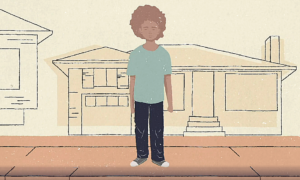That’s the number of foster homes Thomas lived in before he was old enough to drive.
Growing up, Thomas never really knew what it meant to be part of a family. His mother chose a life of drugs over him. His dad tried, but was unable to care for him.
Entering the foster care system at age 11 brought only trauma and confusion into Thomas’ life. He suffered abuse. He was unloved. And every day held the possibility he would have to move again, starting all over in a new home, a new school and a new neighborhood. Constantly living in fear and uncertainty, it was no surprise that he often acted out with anger and aggression.
Ironically, it was just such a confrontation that Thomas had with one of his foster parents in the fall of his senior year in high school that led him to a residential care program.
Thomas’s stay in residential care was only supposed to last a couple of days. But his attorney advocated for a longer placement. It was the turning point in his life.
The family-style home Thomas moved into was unlike any place he had ever lived. His house parents, a trained, married couple who live in the home full time, were responsible for his daily needs and for teaching him the skills that would help him succeed in school, with others and in life. They made sure he did his homework, completed chores around the house and built strong relationships with the other boys in the home.
In the eight months Thomas lived with his residential care family, he found a new direction and purpose.
“I had the greatest caregivers in the world,” Thomas said. “They were so inspiring, so motivating. They taught me what it means to have a mother and a father. They taught me patience and kindness. Had it not been for them, I would not be the man I am today.”
Since graduating high school and leaving residential care, Thomas, now 22, has experienced one success after another. He spent a summer working on Capitol Hill in Washington, D.C., as part of an internship with the Congressional Coalition on Adoption. He has shared his life story as a featured speaker at youth and family care organization events. And next spring he will graduate from Cheyney University in Pennsylvania with a degree in psychology. His future plans include getting a master’s degree in social work and pursuing a career as a clinical psychologist for foster youth.
[Related: Youth Today’s complete foster care coverage]
“They took this lost kid and made him into something great,” Thomas said of his experience in residential care. “I can’t thank them enough.”
Thomas is just one of the tens of thousands of children who have benefited from quality residential care. With this care option, boys and girls with emotional, behavioral or mental health problems can receive the treatment they need from caregivers who are properly trained to address even the most serious challenges these children have faced. Anyone who works in the juvenile justice system, the child welfare system, the mental health care system and the education system knows a troubled child who needs and could benefit from the intensive treatment provided by a quality residential care program.
But some decision-makers and child welfare reformers want to do away with residential care, saying it traumatizes children by removing them from their own family, is expensive and does not produce positive outcomes. These critics don’t differentiate between poor and quality residential care, and they ignore research that shows that quality residential care is the best option for a subset of troubled, high-needs children whose treatment needs cannot be met through less restrictive approaches like foster care and family-based programs.
Quality residential care is often the only answer for stabilizing high-needs children, teaching them the skills they need for success and helping to prepare them for placement in a permanent, forever family. And although quality residential care may cost more in the short term, it results in long-term personal and economic benefits for youth, their families and society.
We strongly disagree with critics who contend that eliminating or restricting quality residential care is the answer to cutting costs, reforming the child welfare system and, most importantly, providing necessary, effective care for youth with the greatest needs. A strong continuum of care is necessary in order to meet the individual and varying needs of these children.
Experience from other countries like Australia and England provide grim examples of how kids suffer when public policy goes too far in restricting effective treatment for children. As these countries dismantled their residential care system, children began to experience more and more failed placements, were placed farther away from their family of origin and were increasingly involved in the juvenile justice system or were homeless.
There will always be young people like Thomas who need more intensive care than foster care or in-home services can provide, and residential treatment advocates want to make sure these children receive the right care, in the right way, at the right time.
Kenneth Bender has served as president/executive director of Boys Town North Florida Inc for the past 11 years.
More stories related to this one:
Senators Push to Keep Kids Out of Foster Care
Making Health Care Access Easier for Young People Leaving Foster Care
California Photographers Focus on Life After Foster Care in New Book
The One Question Foster Care Workers Need to Ask Themselves
Legislation Would Keep Foster Kids From Having to Change Schools





























